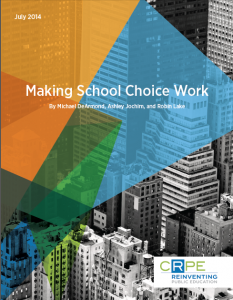Parents of children with special needs are more likely to face challenges in choosing a school for their child, according to a new report.
 As the range of educational choices available to students becomes increasingly diverse, parents have to deal with issues they didn’t encounter when children were simply assigned to schools based on where they lived – issues that the report from the Center on Reinventing Public Education says can create barriers to true school choice.
As the range of educational choices available to students becomes increasingly diverse, parents have to deal with issues they didn’t encounter when children were simply assigned to schools based on where they lived – issues that the report from the Center on Reinventing Public Education says can create barriers to true school choice.
Parents have to grapple with questions, which can often be most difficult for the parents of the most disadvantaged students: What schools are my children eligible to attend? Which school is the best fit? Is transportation available? Who provides it?
For all students to access choice options, the report says, “Leaders need a broader understanding of what’s actually happening where school choice has moved from the margins to the mainstream, including the opportunities and challenges choice brings and under what conditions.”
Researchers surveyed 4,000 parents at eight urban school districts around the country where a majority of parents actively choose their schools. They found the most common barriers for parents in those cities were finding out what schools their child was eligible to attend, finding transportation and getting information about schools.
All of those barriers were more pronounced for parents of children with special needs.
Parents of children with special needs were 33 percent more likely to struggle to understand whether their child was eligible to attend a school, 18 percent more likely to cite transportation as a barrier, and 36 percent more likely to find it difficult to get information to make a good choice compared to parents of general education students. Parents of children with special needs were also more likely to identify other issues as barriers, with 20 percent citing confusing paperwork, 21 percent identifying the large number of applications, and 24 percent citing different application deadlines.
The researchers also looked at 35 high-choice cities around the country, and found “city school systems are often governed by a patchwork of school districts, charter authorizers, and charter school operators. This state of affairs makes it difficult for city leaders to address crosscutting issues (such as parent information systems or transportation) that affect everyone but are no one’s responsibility.”
The two districts in New Orleans, the city with the highest rate of charter enrollment of the eight cities covered in the study (the others were Baltimore, Cleveland, Denver, Detroit, Indianapolis, Philadelphia, and Washington), have taken some steps to help parents deal with the complexity, such as creating a unified school enrollment system. But the report indicates districts around the county need to do more to help parents navigate an assortment of different charter and district providers.
That state of affairs is only going to become more complex with the rise of new, customized learning options, like the Personal Learning Scholarship Accounts that will soon be available to Florida students with certain disabilities. The scholarship accounts will allow parents not only to chose a particular school, but to use education funds for therapies, curriculum and other education-related expenses.
When the state Board of Education was briefed on the program after this year’s legislative session, board member John Padget asked whether scholarship funding organizations (including Step Up For Students, which co-hosts this blog) will fill a role similar to the one “Navigators” were intended to play during the rollout of the Affordable Care Act: Helping parents decipher a complex set of newly available options.
Someone saving for retirement can consult a financial planner to help them select different investment options. Someone building a house will typically hire a general contractor to help them find plumbers, roofers, carpenters and electricians. In medicine, patients often rely on a primary-care physician to refer them to specialists. When choosing a child’s education provider was as simple as finding their assigned school, a similar function wasn’t needed. It is now, but who should fill that role is less clear.
The center says this report is the first in a series that will explore the ways cities with high levels of school choice participation are making their systems work, and the obstacles they face. As choice programs become increasingly commonplace, managing the logistics will be crucial to ensuring all students have access.
Coverage elsewhere:


